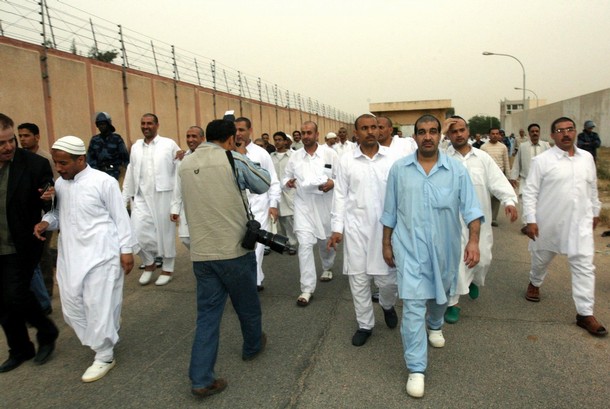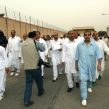
What Next for the Libyan Islamic Fighting Group after Rebuff from the Libyan Regime?
Publication: Terrorism Monitor Volume: 7 Issue: 24
By:

After having given Colonel Qaddafi’s regime what they thought it wanted to hear, namely a rejection of the merger of the Libyan Islamic Fighting Group (LIFG) with Osama bin Laden’s al-Qaeda, the exiled leaders of the LIFG must have been expecting a positive sign from the regime. Instead, what they got was a short statement from the Libyan External Security Organization (ESO – Jihaz al-Amn al-Khariji), calling on those who have become “mature” after having been “misguided” by groups “calling themselves Islamic,” to come back to Libya and reintegrate with Libyan society. So, what has been going on?
A few weeks ago, positive signs were emerging from Libya. After two years of talks between the imprisoned leaders of the LIFG and the Libyan authorities, always in the presence of representatives from the Gaddafi International Charity and Development Foundation (GICDF), headed by Colonel Qaddafi’s son, Saif al-Islam, the imprisoned leaders of the LIFG were reported to have been ready to announce their long-awaited “muraja’at” – their religious/ideological rethinking. Dr. Ali al-Sallabi, a Qatar-based Libyan Islamist, is the most prominent mediator from outside Libya and has been allowed to visit the imprisoned LIFG leaders in the Abu Salim prison in Tripoli. According to al-Sallabi, the LIFG leaders were expected to soon release a religious study countering the ideology of the extremists (IslamOnline, June 17). Al-Sallabi explained that there has been “real progress” in the talks and that the leaders of the LIFG were “nearing the completion of a book that will tackle major ideological issues.” Among these, he named the following:
• The issue of permitting theft of public funds to finance jihad.
• The takfiri practice of accusing countries, regimes and rulers of being kafirs (unbelievers).
• The identification of the proper bodies that should be allowed to declare whether a state, regime or ruler is kafir.
• The issue of “armed activities that take place in Muslim and Western countries.”
• The issue of taking up arms under the pretext of wanting to achieve “change and reform.”
• The issue of initiating a jihad and the conditions necessary to take such a step.
The Exiled Leaders Speak Out
In March, Saif al-Islam’s GICDF announced that the talks with the leaders of the LIFG were progressing and they were tackling the issue of using violence in a Muslim society such as Libya’s. The GICDF went on to announce that preparations were being made to free 170 imprisoned members of the LIFG after another 136 members had been freed over the two years since the talks began. [1] A day after that statement was released, a one-page hand-written statement was issued by the Amir of the LIFG, Abu Abdullah al-Sadeq, in which he affirmed for the first time that talks were being conducted with the authorities, praising Saif al-Islam’s efforts to bring “reform” to Libya (oealibya.com, March 12).
Soon after the talks began, the leaders in exile of the LIFG suddenly started to come forward after years of silence to support the imprisoned leaders in the discussions with the Libyan government. First, there was a letter issued by Abdullah Mansour a former leader of the LIFG in the U.K. and a member of its religious committee (al-Hayat, June 11). Then there was an unsigned statement by a group of “former and present” members of the LIFG in the U.K. (al-Hayat, July 4, 2008). Both the letter and the statement had one aim in common: supporting the talks between the imprisoned LIFG leaders and the Libyan authorities. Both rejected the merger of the LIFG with al-Qaeda that was announced by Dr. Ayman al-Zawahiri and Abu Laith al-Libi in October 2007 (Abu Laith was killed four months later by a missile fired by an American Predator unmanned aerial vehicle in North Waziristan). The statement from former and present LIFG members was clear in saying that Abu Laith lacked the proper authority to merge the LIFG with al-Qaeda. It went on to say that the LIFG as an organization was never part of Bin Laden’s global war on the West and always had a “local aim”: Libya.
Despite its significance, this statement posed a major problem – it was unsigned. No one, therefore, could identify these “former and present” members of the LIFG. Many of them, in fact, had a legitimate reason for not coming forward – acknowledging their link to the LIFG might cause problems with authorities in the U.K., where the LIFG is a designated terrorist organization. This author, however, was able to meet with one of the main figures behind the statement and was assured that it has the backing of LIFG leaders residing in the U.K.
Response of the Libyan Regime
The problem of not being able to reveal their identity was nothing compared with another problem the exiled LIFG leaders were facing; instead of a positive reaction from the government to what they thought was a balanced statement, the Libyan authorities’ reply was a very short statement issued by the ESO. Colonel Qaddafi, the statement said, has issued instructions to the authorities to assist those who have been “deceived” by groups pretending to have an Islamic agenda, but who have now become “mature” enough to know that they were wrong in following such groups, to return to Libya without any fear of being harmed. [2] The statement went on to say that those “misguided” Islamists in exile should be helped in their reintegration with Libyan society and in finding employment. It urged those wishing to come back to Libya to contact authorities so arrangements can be made to repatriate them. The message was clear to the LIFG leaders in exile: if you want to be part of the peace in Libya, return to your country, admit that you were misguided and do not try to make the LIFG equal in any way to the government.
The ESO’s new leader, Abu Zaid Omar Dourda, has headed the service since his appointment in April, six weeks after Moussa Koussa was removed from his post and appointed foreign minister. This change of leadership probably does not have anything to do with the reply the exiled LIFG leaders were given – it was a reply from the whole intelligence service, as an institution. But the changes at the top of the ESO came at a time when Saif al-Islam (the main backer of the talks with the LIFG’s imprisoned leaders) had been suffering from setbacks in his struggle for “reform” with other elements within the Libyan regime. Saif now spends a lot of his time in London, where he is reportedly planning to re-launch a television station that was taken over by the Libyan government in April (Al-Sharq al-Awsat, July 21). This does not mean that he will be exiled; he will surely be able to go back, if he so wishes (he is scheduled to give a speech in Tripoli on August 20). But it does indicate that Saif al-Islam feels more comfortable pursuing his reform policies in London than in Tripoli.
While Saif has been losing the struggle against his opponents inside Libya, the star of his younger brother, Dr. Mutassim Qaddafi, has been on the rise. Mutassim, who is the Libyan National Security Adviser, made an official visit to Washington in April and met with Secretary of State Hillary Clinton, as well as his counterparts from the American National Security Council.
Conclusion
It is unclear how events will develop going forward. For instance, it is uncertain whether the imprisoned leaders of the LIFG will continue with their planned muraja’at, expected in August (before the start of the Muslim holy month of Ramadan – around August 20), and even whether these muraja’at will please the government in their final version.
Moreover, it is also unclear if the Libyan authorities will agree to free the imprisoned leaders (or even some of them) if they do not announce that their group has disbanded. The Libyan government does not tolerate the presence of political parties and it will surely not allow a jihadi organization to regroup, especially after having defeated it.
What is clear, however, is the reaction of the Libyan leaders in Afghanistan and Pakistan. Senior al-Qaeda leader Abu Yahya al-Libi has stated plainly that there is no other way but to use force to topple the regime of Colonel Qaddafi. Abu Yahya made his views known in an audiotape entitled "Ibn-al-Shaykh – The Grave rather Than Retreat" (al-Fajr Media Center, July 25). Abu Yahya spoke at length about Ibn al-Shaykh (a.k.a. Ali Abd-al-Aziz al-Fakhiri), a radical Islamist that the Libyan government announced committed suicide in his cell at Abu Salim prison in May. Ibn al-Shaykh was killed, according to Abu Yahya, because he refused to accept the legitimacy of the rule of Colonel Qaddafi; he refused to retreat from his past conviction that the regime is “apostate.”
The al-Qaeda leader addressed President Qaddafi and his new pro-Western alignment: “You killed, imprisoned, and tortured the youth and elders of Islam in obedience to the United States and in support for its Christian banner, as well as its Crusade. The flags of the United States are flying in the sky of Tripoli, where you buried in the darkness of its unjust prisons the people of faith, monotheism, and righteousness.”
Abu Yahya went on to promise that the mujahideen will take revenge on Qaddafi. How? He explained that “the soldiers of jihad are getting near you, after having their words unified, their forces assembled, their hearts combined, and their banner raised in the Islamic Maghreb, in order to take revenge on you and those who are like you.” This was definitely a clear response from Abu Yahya to those LIFG leaders who rejected the merger with al-Qaeda. He never mentioned them by name, but his words were clear: you will fail if you continue to insist that you are a “Libyan group” and reject being part of al-Qaeda in the Islamic Maghreb (AQIM). At least Abu Yahya himself knows where he stands – he is no longer a leader with the LIFG, but part of al-Qaeda. Now the ball is thrown back into the court of the LIFG leaders to decide whether they are, or are not, part of al-Qaeda. This will surely become clear when (and if) the LIFG releases its long-awaited muraja’at.
Notes
1. “Human Rights Association of the Gaddafi International Charity and Development Foundation Issues a Statement Regarding Dialogue with the Islamic Fighting Group,” Gaddafi International Charity and Development Foundation, March 11.
2. Libyan External Security Organization, https://www.leso.org.ly/ar/index.html





